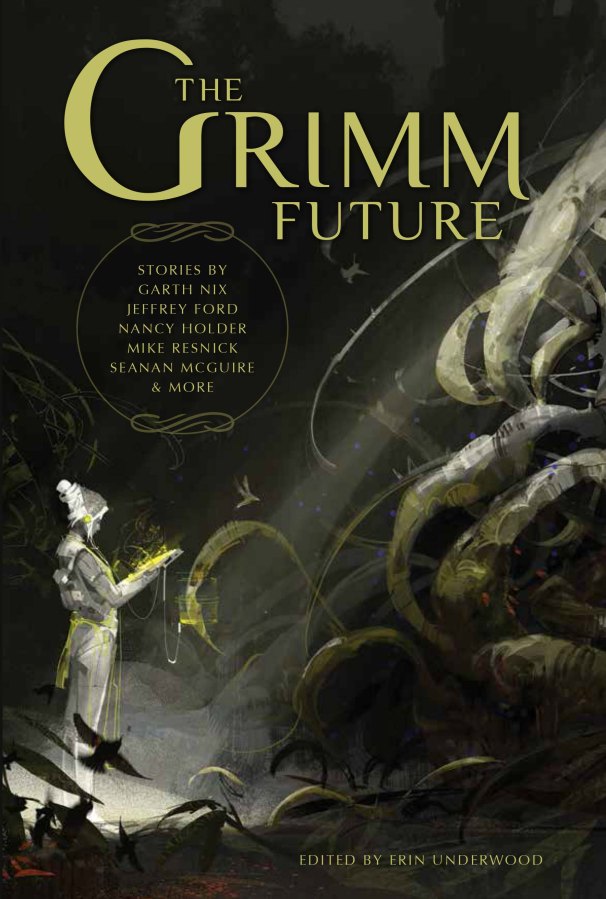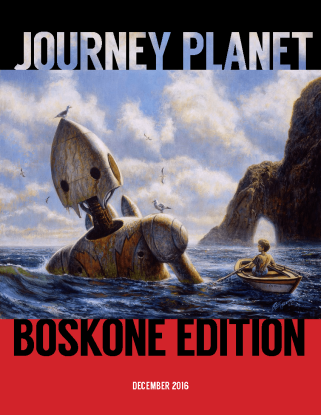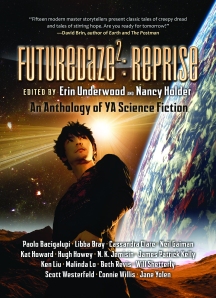 Underwords’ first Why SF? interview is with the extremely talented science fiction novelist and screenwriter Melinda Snodgrass.
Underwords’ first Why SF? interview is with the extremely talented science fiction novelist and screenwriter Melinda Snodgrass.
I first met Melinda several years ago at Boskone, Boston’s local science fiction convention, where she was giving a presentation on writing for television. I was immediately impressed by her knowledge of the writing craft, but it was her love of science fiction that really shined through.
When it came time to approach potential interviewees for Why SF?, Melinda was one of the first people I wanted to include because of her wide breath of experience with the science fiction genre–both in print and in film. Not only is Melinda a true inspiration for science fiction fans, she’s also one of the nicest people you’re likely to meet. It was an honor to include her in the Why SF? and to interview her about her work, her views on science fiction, and her inspirations.
I hope you enjoy Underwords’ first installment of Why SF?
~
What it is about science fiction that you love or that inspires you most to write?
The optimism. The sense that there is a galaxy out there waiting for us to come and explore. I also want to write about characters who are finding their inner reserves. Who don’t think they can rise to the challenge, but somehow find the strength.
Science fiction is a large part of your writing life. What or who were some of the most important SF influences as a reader or as a writer?
A lot of early Heinlein — Have Spacesuit Will Travel, Citizen of Galaxy, Moon is a Harsh Mistress. Poul Anderson, Andre Norton, Zelazny. I never tried to write like any of them, but I tried to figure out why their stories were so compelling.
What kind of challenges, if any, have you faced as a female science fiction novelist and/or television writer? How did you overcome those challenges?
I didn’t see much affect on my prose writing career from being a woman. It is more common in Hollywood where you get pushed toward shows with more “female” themes which was not a good fit for me because I was and am known as “that chick who writes action.” I think the best way to overcome these stereotypes is to write scripts that can’t be ignored or pigeon holes.
As a science fiction writer living in an age that would have once been considered a “science fictional” world, where do you like to see SF literature go from here?
I’d like to see more space based science fiction like Heaven’s Shadow or Leviathan Wakes. I enjoy space opera, and I want stories that take me to the stars, not stories that tell me how shitty things are going to be on Earth. I prefer optimistic science fiction over dystopias.
 How would you describe The Edge series for readers who are unfamiliar with your current SF novels?
How would you describe The Edge series for readers who are unfamiliar with your current SF novels?
The Edge books are the story about an eons long struggle between the forces of science and rationality on one side, and superstition, magic and religion on the other. I come down on the side of science.
What have you enjoyed most about working on The Edge series?
Experiencing my main character as he finds that inner strength, and comes to accept who and what he is. It’s also fun to get take on the toxic mix of politics and religion that now corrupts our political system. The rise of the religious right, and the Republican’s party rejection of rationality is one of the reasons I wrote these books.
You and George R. R. Martin created the Wild Card novels together, what is it about that series that has kept it going all of these years over a span of nearly 20 books?
The characters and their interactions. People don’t read prose superheroes for the big fight sequences–they are more effective in a comic or on the screen, but what Wild Cards has done is told very real stories about the human heart in conflict with itself.
On the advice of a friend to try your craft in Hollywood, you wrote a spec script for Star Trek: The Next Generation. Why Star Trek? What was it about that series that made you take a chance on a spec script?
 It was George R.R. who encouraged me try my hand at screenwriting. He thought I would be good at it since my strength is plotting, strong characters, and good dialog. He said if I wrote a spec he would show it to his agent. I looked at the various shows–L.A. Law, I felt it was too intricately plotted for me to write an effective script. Beauty and the Beast–I couldn’t do that, George was on the show, and what if I wrote a crappy script? That would really have put him on the spot.
It was George R.R. who encouraged me try my hand at screenwriting. He thought I would be good at it since my strength is plotting, strong characters, and good dialog. He said if I wrote a spec he would show it to his agent. I looked at the various shows–L.A. Law, I felt it was too intricately plotted for me to write an effective script. Beauty and the Beast–I couldn’t do that, George was on the show, and what if I wrote a crappy script? That would really have put him on the spot.
I grew up as a kid on original Trek and loved it so I picked Next Generation. I watched a number of episodes, decided Data was the most interesting character (which is pretty ironic since he’s a robot), and wrote the script.
Your Star Trek: The Next Generation episode “Measure of a Man”, your spec script, is often regarded as one of the best episodes of the series. What was the inspiration behind that episode? How much of yourself did you put into that story?
I couldn’t have written “Measure” without my law school training. It’s basically the Dred Scott decision updated and applied to Data rather than an escaped slave. I had a friend who was a navy officer who said that when you can’t have a formal JAG hearing the captain of a ship always defends and the first officer prosecutes. That put Picard and Riker in direct conflict with Data’s life at stake. That’s pure drama.
Currently, there are only a few original science fiction television series still airing on TV. For instance, Doctor Who and Alphas seem to have survived the most recent spate of cancellations so far this season compared to only a few years ago when multiple shows were being aired, renewed, and created. What do you think is missing from SF television today?
There’s a ton of science fiction on television. Basically we won. Movies and TV are all SF and fantasy. Grimm, Once Upon a Time, Game of Thrones, Alphas, Dr. Who, Awake, Terra Nova, Falling Skies, etc. etc. Granted some of them have been canceled, but they deserved to be–they weren’t good shows.
I wish they’d do another big space show, but they’re expensive, and you need to have the right mix of characters.
What would you like to see more of from the science fiction genre–either in print, film or television?
More space, more distant worlds, more adventure.
What are you working on now? Any new projects, novels, or stories that will be out soon?
I have the first book in a new urban fantasy series set in a vampire law firm that will be coming out in September called THIS CASE IS GONNA KILL ME. I’ve written it under the name Phillipa Bornikova so there won’t be confusion since it’s a very different genre.
- I’m writing an Old Mars story for George R.R. Martin and Gardner Dozois.
- I’m writing for and editing the next Wild Card book LOWBALL.
- I’m writing on the third Edge novel.
- And I’m outlining and getting ready to write the Wild Card movie for Universal’s SyFy Films division.
I’m kind of busy, but it’s fun.
~
 Melinda Snodgrass – After eight years as a novelist which included the publication of her CIRCUIT trilogy, and co-creating, editing, and writing for the Wild Card series, Melinda began her career as a story editor on STAR TREK:TNG, and wrote the Writer’s Guild Award nominated script THE MEASURE OF A MAN. She worked for REASONABLE DOUBTS, and PROFILER, wrote six pilots, and had one produced and aired, STAR COMMAND. She is currently working on the third book in the EDGE series, has delivered the first book in a new urban fantasy series, and is starting on the second. She has two screenplays currently under consideration in Hollywood. Visit her online at http://www.melindasnodgrass.com/
Melinda Snodgrass – After eight years as a novelist which included the publication of her CIRCUIT trilogy, and co-creating, editing, and writing for the Wild Card series, Melinda began her career as a story editor on STAR TREK:TNG, and wrote the Writer’s Guild Award nominated script THE MEASURE OF A MAN. She worked for REASONABLE DOUBTS, and PROFILER, wrote six pilots, and had one produced and aired, STAR COMMAND. She is currently working on the third book in the EDGE series, has delivered the first book in a new urban fantasy series, and is starting on the second. She has two screenplays currently under consideration in Hollywood. Visit her online at http://www.melindasnodgrass.com/







Melinda, you have me grabbing for my Tardis t-shirt and my laptop. Thanks for the inspiration and some new MUST READ Sci-Fi titles.
Melinda is the best. Long live SF!
I’m glad you enjoyed the interview.
Pingback: Communion of Dreams, James T. Downey (Artifact Imprints, 2012) | The Archaeologist's Guide to the Galaxy.. by Thomas Evans